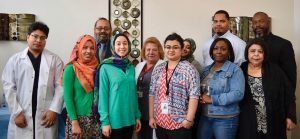The Yemeni American News
Amaal Haimout is driven by the belief that no matter your income or backround, you deserve adequate and equal access to healthcare. As the clinic director at Wayne County Healthy Communities in Hamtramck, she works to make this principle a reality.

Healthy Communities provides affordable healthcare services that include primary care, behavioral health, dentistry and other resources. Its website has a bilingual banner that informs potential patients in English and Arabic that uninsured clients are welcome.
At Hamtramck, Haimout is in a unique position to address healthcare disparities. She said the city’s diversity makes it a “perfect place” for her.
“That’s what really drew me to work at Wayne County Healthy Communities,” she said. “This melting pot of all these cultures and different patients I get to work with every day.”
Despite her leadership position, Haimout sometimes translates for Yemeni patients.
Growing up in an immigrant Michigan, she says Arabic was her first language.
In an interview with the Yemeni American News, Haimout urged young women to be confident and pursue their dreams without taking “no” for an answer.
Responses below have been edited for space and style.
YAN – What did you do before working here?
I was a Health Leaders Fellow, I worked with the Ecology Center in Ann Arbor. I lobbied energy bills in Lansing. I learned about the environmental health aspect within hospital and healthcare systems and lead exposure. It’s like another aspect of public health. More of an environmental aspect and how that relates to human health.
YAN – You chose to serve in Hamtramck, were you thinking about how others perceive the city when you chose to come here?
Actually, the funny thing is, people have responded that way, they’re like, ‘Oh you were going to Hamtramck?’
Some people view Hamtramck as a ‘low economic’ area and think there’s not very many professionals there but it’s quite the opposite.
There’s so much you can do to grow and even working here for the past year we’ve come such a long way and our patients always tell us, ‘Thank you so much for the services that you do for this community.’
People are still people even though they have a ‘low economic’ income it doesn’t mean they are any different from me or someone who lives in Bloomfield or San Francisco. Just because they don’t make a certain amount of money doesn’t mean that they don’t deserve the health that I deserve or the president of the United States. They still deserve the same access to healthcare. They still deserve dental health, the best oral health, the best physical health, the best mental health and if I can do that for this community then why not? That’s what I tell myself every day.
YAN – When you meet women, especially Yemeni women new to this country what do you tell them?
I am a woman and I have an ethnic background, my parents immigrated to this country in the 1980s so I understand the struggles that our patients go through.
I tell them that they’re welcome here, despite their immigration status, despite their income level, despite the languages that they speak. We welcome everyone.
We want to welcome you into our home. We consider ourselves a medical home not just a clinic.
YAN – As a professional, how do people view your hijab?
I live in Troy and there aren’t very many Muslims in Troy. What I tell myself is, ‘I am a US citizen, I was born and raised here, I’m human, you’re human, you will treat me with respect.’ If someone discriminates against me I will not accept that. I will be very firm and confident in who I am and I will address the person.
I tell women that it’s not easy but that doesn’t mean that it’s not possible for you to work in another environment with the headscarf. Be proud of who you are. Walk with your head tall and tell people, ‘I am a Muslim American. We can still coexist together, we can work together, you can learn for me, I can learn from you. That will make us stronger as workers, as neighbors, as a community.’
YAN – What’s your advice to the young women in Hamtramck?
If you’re really passionate about something, pursue it no matter what. Even if your parents might not see the value in it or your neighbors or your friends, don’t take no for an answer.
Some people doubted me when I decided on public health. I said, ‘I can do a lot of things and if you don’t believe me, watch me.’ Prove to yourself first and foremost and then success will follow.
A Hamtramck girl needs confidence in who she is as a woman, as a girl she needs to understand who she is in order to navigate throughout life. She also needs support from her family.












